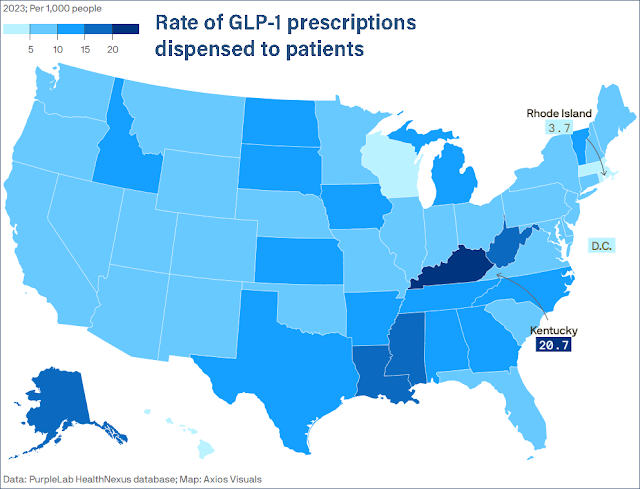Kentucky has the nation’s highest rate of dispensed prescriptions for a new class of diabetes and obesity medications, according to the analytics company PurpleLab and published by Axios.
“For every 1,000 people in Kentucky, roughly 21 were prescribed a drug that belongs to a buzzy class of diabetes and anti-obesity medications last year,” Tina Reed of Axios reports.

The drugs are GLP-1 agonists, which mimic a hormone that triggers the release of insulin, which lowers blood sugar; slows digestion; and increases the feeling of fullness after eating. They were developed to treat diabetes but have become popular in treating obesity, in which Kentucky ranks high.
“GLP-1 agonists alone can’t treat Type 2 diabetes or obesity,” the Cleveland Clinic cautions. “Both conditions require other treatment strategies, like lifestyle and dietary changes.” The drugs are costly, running between $900 and $1,300 a month, and most must be injected into fatty tissue.
Axios reports that after Kentucky, West Virginia had the next highest prescribing rate, at 18.9 prescriptions dispensed per 1,000 residents. That was followed by Alaska (17.5), Mississippi (16.1) and Louisiana (15.4). Rhode Island had the lowest rate (3.7), and Massachusetts was second lowest (4), followed by Wisconsin (4.3) and Hawaii (4.3.)
The figures come from a collection of 1.9 billion claims to private insurers, Medicare (which only covers GLP-1s to treat diabetes) and Medicaid. “The data lumps the prescriptions together, so it’s not possible to tease out how often these drugs are being prescribed for obesity versus diabetes,” Axios notes.
In another story Reed reports, “Doctors are getting inundated with patients’ requests … including from many who don’t really need them. Primary-care doctors in particular, who typically have little training in obesity, have found themselves as gatekeepers for a class of injection drugs, including Novo Nordisk’s Ozempic and Wegovy, that are effective but still face questions about who should take them.”





